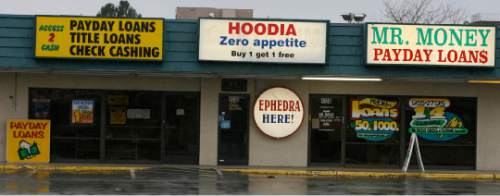This is an archived article that was published on sltrib.com in 2015, and information in the article may be outdated. It is provided only for personal research purposes and may not be reprinted.
A new poll says about three of every five Utahns favor more regulation of payday loans — which now carry an average 466 percent annual interest in the state.
That comes on top of reforms passed last year after the payday loan industry played a key part in scandals that toppled former Utah Attorney General John Swallow.
The new Dan Jones & Associates poll for UtahPolicy.com found that 57 percent of Utahns favored, and 37 percent opposed, the sort of extra reform now being proposed by Rep. Brad Daw, R-Orem.
He is working on a bill to require lenders to create a database of all current payday loans in the state, and then limit to two the number of loans anyone could have at one time. It also would cap the amount of loans to no more than 25 percent of a borrower's monthly income.
Those changes would be designed to stop people from taking out loans from one company to pay another, which critics say is common and creates inescapable debt. Daw proposes to fund the database through a transaction fee on payday loans.
House investigators said last year that payday lenders spent hundreds of thousands of dollars, funneled by Swallow in hard-to-trace ways, on a nasty mail campaign to defeat Daw in 2012 after he had unsuccessfully pushed similar industry reforms.
Daw managed to win back his House seat in the last election, and has vowed to push more industry-reform bills.
"I'm not at all surprised by the poll," he said. "What payday lenders are doing is predatory, abusive and needs to be curbed."
He said he did similar, less scientific polling in his own district with similar results. "My district is about as conservative as you get in the state, and it said overwhelmingly that it is time to do this database."
Michael Brown, spokesman for the Utah Consumer Lending Association of payday lenders, said databases such as those proposed by Daw have been implented in other states, and "led payday loan customers to turn to higher cost, unregulated offshore Internet lenders."
He added, "We are strongly convinced that a government-run database in Utah will yield similar results, forcing consumers to abandon the strong consumer safeguards already enacted by Utah's Legislature in order to solve a short-term financial problem."
Last year amid the Swallow scandal, the Legislature enacted other reforms in a bill by Rep. Jim Dunningan, R-Taylorsville, who led the House investigation into Swallow.
That new law gave borrowers 60 days after reaching the 10-week limit on a payday loan to pay off the debt without lenders taking any further action against them, such as filing a default lawsuit. It required basic credit checks to ensure customers could likely afford loans.
It also requires lenders to file any default lawsuits in the same area where borrowers obtained the loan. Dunnigan said lenders had done such things as sue people living in St. George in an Orem court, making cases difficult to defend.
A recent report by the Utah Department of Financial Institutions found Utah payday loans now average 466 percent annual interest. In comparison, academic studies say the New York mafia charged 250 percent interest for its loans in the 1960s.
At the average rate, Utah payday loans cost $17.93 in interest every two weeks per $100 borrowed. The state report said the highest interest charged on any Utah payday loan was an astronomical 1,564 percent annual interest — about $60 every two weeks per $100 loaned.
Utah has no cap on the interest that may be charged.
The payday loan industry says the rates it charges are still cheaper than such things as fees for bounced checks or to restore disconnected utilities. It also says its loans are among few that people with bad credit may obtain — so they naturally cost more.
The poll question was: "Utah's payday loan industry has been controversial in the Legislature. One proposed reform would establish a central database tracking payday loans and setting limits on the number of loans and loan balances a consumer can have. Any consumer who has more loans than allowed, or a balance higher than the limit, would be ineligible for additional loans. Opponents say borrowers should be able to get as many loans as they can obtain without any balance limits. Do you favor or oppose a law establishing such a database tracking payday loans and setting limits?"
The poll of 609 registered voters was conducted Dec. 2-10, and has a margin of error of plus or minus 3.97 percent.









